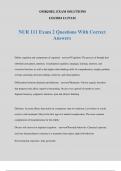©SIRJOEL EXAM SOLUTIONS
12/3/2024 11:27AM
NUR 111 Exam 2 Questions With Correct
Answers
Define cognition and components of cognition - answer✔Cognition: The process of thought that
embodies perception, attention, visual/spatial cognition, language, learning, memory, and
executive function; as well as the higher-order thinking skills of comprehension, insight, problem
solving, reasoning, decision making, creativity, and metacognition.
Differentiate between dementia and delirium. - answer✔Dementia: Various organic disorders
that progressively affect cognitive functioning. Occurs over a period of months to years.
Impaired memory, judgment, attention, span and abstract thinking
Delirium: An acute illness that results in a temporary state of confusion. Lasts hours or weeks,
resolves with treatment. May be the first sign of a medical complication. The most common
complication of hospitalization for the elderly
Discuss risk factors for impaired cognition. - answer✔Personal behaviors: Chemical exposure,
activities that predispose someone to a traumatic brain injury, high-risk behaviors
Environmental exposures: lead, pesticides
, ©SIRJOEL EXAM SOLUTIONS
12/3/2024 11:27AM
Congenital and genetic conditions: chromosomal abnormalities, downs syndrome, fragile X
syndrome
Maternal Issues: Fetal alcohol syndrome, illegal drug exposure
Discuss nursing assessment tools for impaired cognition. - answer✔Mini-mental examination: A
standardized cognitive assessment tool, provides II cognitive tasks
Confusion Assessment Method (CAM)
Mini-Cog
Discuss nursing interventions when caring for clients with impaired cognition -
answer✔Pharmacotherapy, predictable routine, consistent caregivers, simple instructions, eye
contact, presence of familiar items/people, sensory aids, allowed to be involved in decision
making, promote general health and comfort, reorientation, pain management and comfort,
regulation of stimulation, behavioral management, sensory aids, caregiver support
Metacognition - answer✔awareness and understanding of ones own thought processes
Perception - answer✔The interpretation of the environment
Memory - answer✔The retention and recall of past experiences and learning
Executive Function - answer✔The higher thinking process that allows us to be flexible
Declarative Episodic - answer✔information r/t specific events
, ©SIRJOEL EXAM SOLUTIONS
12/3/2024 11:27AM
Declarative Semantic - answer✔memory of knowledge, words and facts
Declarative - answer✔"long-term" memory, storage of large amounts of information
Working - answer✔"short-term" memory, small amounts of information (maintained) for short
periods of time
Procedural - answer✔retention and retrieval of motor skills (part of long-term memory)
Intact - answer✔individual exhibits cognitive behaviors that are considered to be "normal" for
age and culture
Impaired - answer✔measurable or observable disturbance in one or more cognitive functions
Basic Cognition Functioning - answer✔perception, pattern recognition, attention
Higher Order Cognition Functioning - answer✔Learning, comprehension, insight, problem
solving reasoning, decision making, creativity, metacognition
Abstract Reasoning - answer✔Understanding complex ideas through analysis or evaluation
(understanding stuff like "the early bird catches the worm" and knowing that you're not really
talking about birds and worms)
Glasgow Coma Scale - answer✔An assessment tool to test best eye response, best verbal
response and best motor response
, ©SIRJOEL EXAM SOLUTIONS
12/3/2024 11:27AM
Decorticate Posture - answer✔Their legs are extended but their arms are bent and their fists are
clenched. Due to severe brain injury
Decerebrate - answer✔When the upper arms and limbs are extended, toes are pointed down,
head and neck may be arched back and the muscles are rigid. Caused by brain injury
Mental Retardation - answer✔developmental disorder
Delirium - answer✔global cognitive disorder
Dementia - answer✔global cognitive disorder
Focal Cognitive Disorders - answer✔amnesia, aphasia, executive function disorders, etc...
Aphasia - answer✔loss of ability to understand or express speech. Caused by brain damage
Amnesia - answer✔Some loss of memory. Caused by brain damage
Primary Dementia - answer✔- irreversible and is not caused by a secondary disease
Secondary Dementia - answer✔irreversible and occurs as a result of another disease process
Agnosia - answer✔inability to process sensory information
Delusions - answer✔are false beliefs that misinterpret the environment or experiences
Diagnostic tests for cognition - answer✔Lab tests: to rule out medical problems




